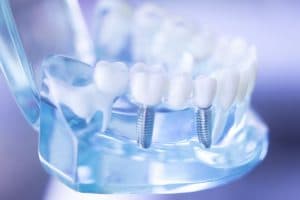 After experiencing tooth loss, the most immediate concern you may have is filling the gap to restore your smile’s appearance and your bite’s ability to function properly. However, even after replacing lost teeth with a conventional bridge or denture, several of the more profound consequences of tooth loss may still continue. Those effects are due mainly to the loss of your healthy, natural teeth roots, and the only way to address them is to replace those roots. At our Encinitas/San Diego, periodontal office, we offer lifelike dental implants that prevent these consequences by providing a biocompatible prosthetic option for replacing lost teeth roots.
After experiencing tooth loss, the most immediate concern you may have is filling the gap to restore your smile’s appearance and your bite’s ability to function properly. However, even after replacing lost teeth with a conventional bridge or denture, several of the more profound consequences of tooth loss may still continue. Those effects are due mainly to the loss of your healthy, natural teeth roots, and the only way to address them is to replace those roots. At our Encinitas/San Diego, periodontal office, we offer lifelike dental implants that prevent these consequences by providing a biocompatible prosthetic option for replacing lost teeth roots.
1. A shifting prosthesis
The loss of your teeth is permanent, but sometimes, a bridge or denture doesn’t seem like a permanent solution because it doesn’t always retain its original fit. After years of use, many patients’ prostheses will grow loose and begin to shift along their gums, creating uncomfortable and painful friction. When secured to one or more dental implants, however, a prosthesis doesn’t move. Instead of relying on solutions like dental adhesives, hidden clasps, and abutment teeth, the bridge or denture is anchored in place by root-like implant posts.
2. Jawbone degradation
One of the most important reasons why dental bridges and dentures lose their grip is because your jawbone can lose mass and density after losing teeth roots. Their loss means that your jawbone isn’t as stimulated when you bite and chew. Therefore, it receives fewer nutrients every day, and over time, this can lead to jawbone degradation. By replacing your lost teeth roots, dental implants not only hold your prosthesis in place more securely, but also restore the stimulation in your jawbone when you bite and chew. This preserves the flow of essential minerals and nutrients to your jawbone that it needs to remain strong and healthy.
3. Facial collapse
When it continues long enough, jawbone degradation can also begin to have visible effects on the appearance of your smile and surrounding facial structures. This appearance, known as facial collapse, can be difficult to address once it becomes serious enough. However, replacing your lost teeth with a dental implant-supported prosthesis can help prevent it from occurring by stemming or preventing jawbone degradation from lack of stimulation. This also makes it easier to restore your smile and your bite’s function, as the supportive structures around your implants and remaining teeth will remain healthy following your tooth loss.
A better smile after losing teeth
Dental implants can prevent the consequences of tooth loss that traditional bridges and dentures can’t address. For more information, schedule a consultation with Dr. Kania by calling her periodontal office in Encinitas/San Diego, CA, at (760) 642-0711.



